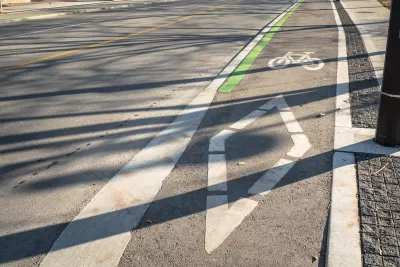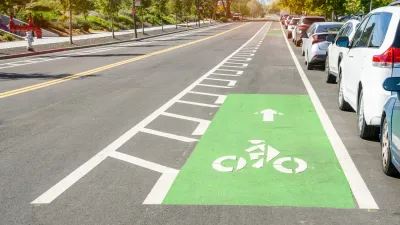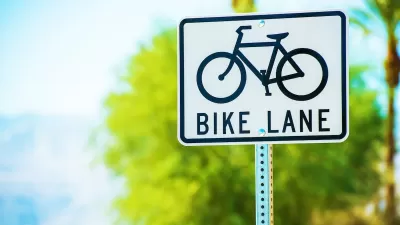Some cities are going so far as to rip out protected bike infrastructure that took years of advocacy to build.

“The trend to remove bike lanes is growing, and it is scary, and based in an imaginary world where the only thing that exists is a car and its suburban driver,” writes Ron Johnson in Momentum, drawing attention to a troubling trend that is seeing city officials in U.S. and Canadian cities removing hard-won bike infrastructure.
At the federal level in the United States, President Trump has expressed disdain for bike lanes and a desire to kill New York City’s congestion program (along with its bike infrastructure). But the trend began before his election, with cities like Ontario and San Mateo moving to destroy existing bike infrastructure.
It’s one thing to remove a painted bike lane, which offered little protection anyway. But, to invest the resources to actually remove safe and separated bike lanes that take planning, and millions of dollars of investment, is so non-sensical it’s always comedic if it weren’t so tragic.
For Johnson, part of the problem stems from the lack of long-term vision and commitment to cycling infrastructure. “A real bike network isn’t just a few painted lines or token bike boulevards. It’s a commitment to creating a connected, protected network that spans an entire city—one that allows cyclists to get from point A to point B without dodging traffic, worrying about unsafe intersections, or feeling like an afterthought in a car-dominated city.”
People who want to see bike infrastructure continue to grow must, in Johnson’s view, advocate loudly for it against the tide of opposition. “It won’t be easy, but it’s crucial that we continue to push for safe, accessible, and well-connected bike networks in our cities.”
FULL STORY: Cities Start to Backpedal on Bike Lanes: A Growing Crisis for Cyclists

Montreal Mall to Become 6,000 Housing Units
Place Versailles will be transformed into a mixed-use complex over the next 25 years.

Planetizen Federal Action Tracker
A weekly monitor of how Trump’s orders and actions are impacting planners and planning in America.

DARTSpace Platform Streamlines Dallas TOD Application Process
The Dallas transit agency hopes a shorter permitting timeline will boost transit-oriented development around rail stations.

Without International Immigrants, the Rural US Population Would Be Falling 58%
Census data shows that population growth in rural areas is due in large part to international migrants.

Dead End: Nine Highways Ready for Retirement
The Freeways Without Futures report describes the nation’s most promising highway removal proposals.

Congressman Proposes Bill to Rename DC Metro “Trump Train”
The Make Autorail Great Again Act would withhold federal funding to the system until the Washington Metropolitan Area Transit Authority (WMATA), rebrands as the Washington Metropolitan Authority for Greater Access (WMAGA).
Urban Design for Planners 1: Software Tools
This six-course series explores essential urban design concepts using open source software and equips planners with the tools they need to participate fully in the urban design process.
Planning for Universal Design
Learn the tools for implementing Universal Design in planning regulations.
City of Mt Shasta
City of Camden Redevelopment Agency
City of Astoria
Transportation Research & Education Center (TREC) at Portland State University
City of Camden Redevelopment Agency
Municipality of Princeton (NJ)
Regional Transportation Commission of Southern Nevada





























